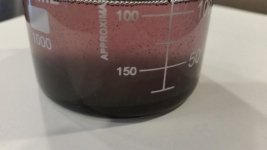Trevor Jessie
Yoda
Offline
I try to bleed mine every 2-3 years.
Why?
1. If you are using regular glycol based brake fluid it absorbs water and can cause cylinder walls to rust ... and that leads to brake failure. There can also be a build up of rubber debris from seals and rubber hoses... and that can lead to brake failure.
2. If you are using silicone fluid, then water can condense in the system and work its way into the cylinders and again cause rust...and that leads to brake failure. The bigger problem with the silicone fluid is that it doesn't lubricate as well and the rubber seals in the cylinders degrade and collect and clog lines...and that can lead to brake failure.
Of course you should also visually inspect your brake hoses every year as well. Replace any that show signs of damage or are older than 10 years old.
I'm working on a bugeye that has silicone brake fluid, teflon brake hoses, and disk brakes in the front. The attached picture shows what was flushed out of the brake/clutch system. To my knowledge, the brakes have not been bled in at least two years.
Why?
1. If you are using regular glycol based brake fluid it absorbs water and can cause cylinder walls to rust ... and that leads to brake failure. There can also be a build up of rubber debris from seals and rubber hoses... and that can lead to brake failure.
2. If you are using silicone fluid, then water can condense in the system and work its way into the cylinders and again cause rust...and that leads to brake failure. The bigger problem with the silicone fluid is that it doesn't lubricate as well and the rubber seals in the cylinders degrade and collect and clog lines...and that can lead to brake failure.
Of course you should also visually inspect your brake hoses every year as well. Replace any that show signs of damage or are older than 10 years old.
I'm working on a bugeye that has silicone brake fluid, teflon brake hoses, and disk brakes in the front. The attached picture shows what was flushed out of the brake/clutch system. To my knowledge, the brakes have not been bled in at least two years.

 Hi Guest!
Hi Guest!

 smilie in place of the real @
smilie in place of the real @
 Pretty Please - add it to our Events forum(s) and add to the calendar! >>
Pretty Please - add it to our Events forum(s) and add to the calendar! >> 

